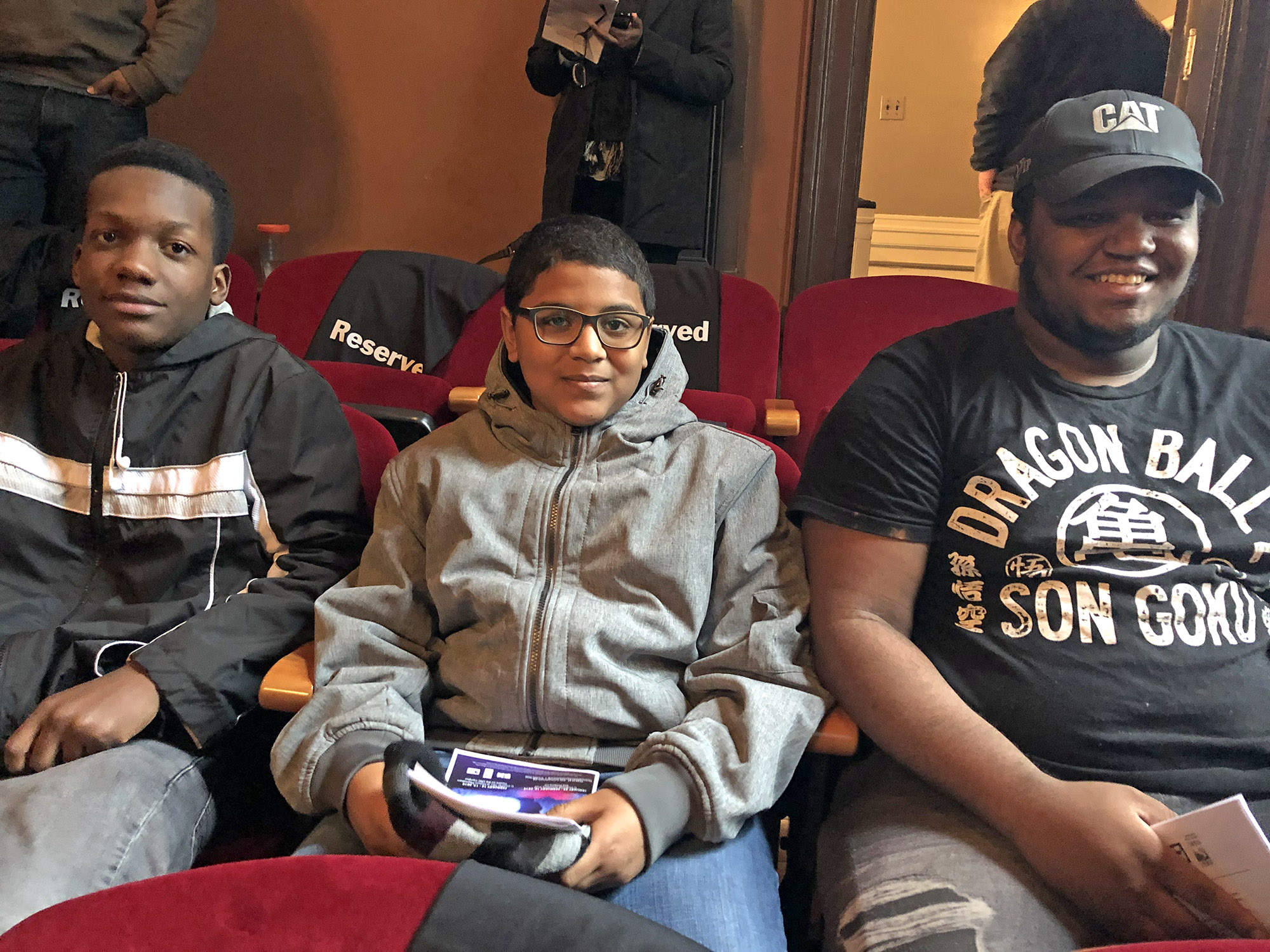
Past and present PYO participants (left to right) Kimathi Reed-Bandele, Michael Koonce and Lamon Jones attend a performance of Sonny Kelly’s one-man show “The Talk” at the Historic Playmakers Theater in Chapel Hill, N.C. Feb. 17. All three have received “talks” from their family members about issues of race and safety, similar to the talk Kelly has with his oldest son, Sterling Kelly, in the play. (Staff photo by Adrianne Cleven)
A performance just isn’t a performance without an audience. And some unique members of the audience during Sonny Kelly’s performance of his play, “The Talk,” added extra significance to the experience on Feb. 17.
“The Talk,” which centers around themes of racial oppression and resilience, has been making waves across Durham and Chapel Hill since Kelly wrote it in 2015. But this time, a group of Partners for Youth Opportunity participants and leaders attended the performance at the Historic Playmakers Theatre in Chapel Hill. LaMon Jones, a former PYO participant, was in attendance and appreciated the meaning behind “The Talk”
“There’s a message in this play that needs to be received, especially by young African-Americans,” Jones said.
The group, sponsored by The Durham VOICE, also included PYO Workforce Development Director Carlton Koonce and PYO Academic Director Dosali Reed-Bandele. Koonce, Dosali Reed-Bandele and other PYO staff members work to close the “opportunity gap” among Durham youths by providing work opportunities and helping with college preparation. Koonce’s son, Michael, and Reed-Bandele’s son, Kimathi, also attended the play.
The PYO group soaked up Kelly’s poetic and painful memories and listened to his stories of oppression, violence and police brutality leveled toward the African-American community. In a written reflection after the experience, Koonce remarked on the importance of the play for his son, who is a fifth-grader.
“To see the tragic story of so many young men that he’d learned about in school – Emmett Till and Tamir Rice, who were not much older than him when they were killed – it really brought the issues we’ve been talking about as a father/son to the forefront for him,” Koonce wrote.
The three youngest members of the group – Jones, Michael Koonce and Kimathi Reed-Bandele – have all experienced talks like the one in Kelly’s play: words of loving caution from relatives about the dangers of racism and the need for vigilance.
Michael Koonce said his father has taught him that if he is ever stopped by an police officer, “the most important thing is just to act polite and to do what they tell you to do.”
Jones was involved with PYO before he graduated from high school in 2016, and his internship the program helped him land his current job. Throughout his younger years, Jones’ grandmother had many talks with him about the need for caution in public spaces.
“I have seen performances that had racial undertones behind them,” Jones said. “If you are paying attention, you’ll be able to see it … but with this, a performance specifically designed to call out something that needs to be called out about racism in the modern age and how it’s portrayed to us, I’ve never seen any performance comparable to this one.”
Kimathi Reed-Bandele, a ninth-grader, has been involved with PYO since last year. Though he had background knowledge on the subject, he thought Kelly’s performance was special. To him, the most powerful moment of the play was when Kelly had a version of the talk with his son, Sterling, because it reminded him of his own importance.
“That really touched me,” Kimathi Reed-Bandele said, “because parents need to have that talk with their children.”
Kimathi Reed-Bandele’s mother, Dosali Reed-Bandele, agreed.
“It reminded me that I still have work to do to see that the talk that I have with every young person that I encounter will leave them knowing that they are worthy of recognition, worthy of respect and worthy of life,” she said in a follow-up reflection.
Jones has had strong feelings about the themes in Kelly’s play for a while.
“I feel as if we shouldn’t have to live in a world where these talks are necessary,” he said.
Staff writer Diane Adame contributed reporting.
Click here for a printer-friendly version of this story